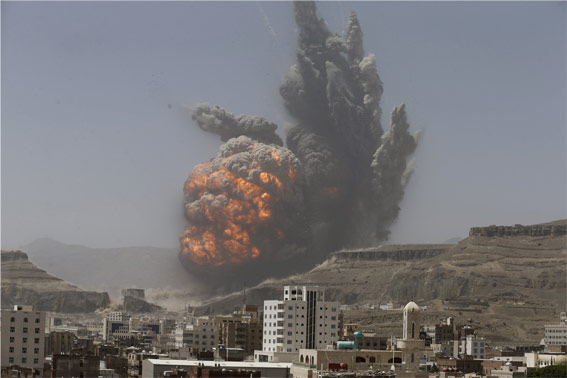 Senior analyst with the Jamestown Foundation has said the US policy makers have learned nothing from fourteen years of trillion dollar failures in Afghanistan and Iraq and now Libya, Syria, and Yemen.
Senior analyst with the Jamestown Foundation has said the US policy makers have learned nothing from fourteen years of trillion dollar failures in Afghanistan and Iraq and now Libya, Syria, and Yemen.
“As in most parts of the world where the US has waged its war on terror, the supposed targets—terrorist organizations like al-Qaeda and the Islamic State—are the primary beneficiaries,” wrote Michael Horton in an article posted on Counter Punch.
“These organizations exploit and feed off the chaotic and divisive environments that arise from short-sighted and uninformed “whack a mole” counter-terrorism strategies,” he added. “Such an outcome is perfectly acceptable to the thriving military-industrial complex that drives and profits from US foreign policy.”
He went on to mention Yemen as one of the countries where the disastrous consequences of the war on terror are most evident and potentially most consequential, adding, “Much of southern Yemen, which includes areas that Saudi Arabia and its allies claim to have ‘liberated,’ is being infiltrated by al-Qaeda in the Arabian Peninsula (AQAP) and the Islamic State.”
“Yemen’s internationally recognized government—most of whose members remain in their villas in Saudi Arabia—has been unable to assert its authority in the liberated areas. As one of the better organized forces in the country, AQAP is filling the void.”
Horton added that the US has spent billions of dollars on its war on terror in Yemen. “It is worth contemplating what the political situation in Yemen would look like if even a fraction of that money had been spent on programs that tackled the real issues that drive instability in Yemen like water shortages, government corruption, a lack of schools and medical facilities, and food insecurity.”
“This war has killed thousands, impoverished millions, and effectively ceded control of large parts of Yemen to AQAP and other militant Salafi organizations.”
He finally noted that the US’ war on terror in Yemen has done nothing but increase instability, embolden terrorist organizations, and ensure years—likely decades—of healthy profits for the companies that make up the military-industrial complex. “These companies—not the American or Yemeni people—are reaping the fruits of a war without end.”
